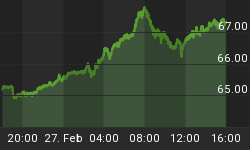The combination of Tuesday's CPI numbers and today's retail sales report has the markets all a-flutter in anticipation of a rate hike from the Bank of England (BoE) before this quarter is out. However, market-watchers should pay more attention to the minutes of the BoE's last Monetary Policy Committee (MPC) meeting, released yesterday, and to a speech today from Deputy Governor Gieve. While the next move from the MPC will likely be a rate hike, it is unlikely to come until Q4.
First: the numbers. A record increase in household utility bills pushed the headline inflation rate to a nine-month high of 2.5% in June, above the BoE's 2.0% target. The retail price index, on which many pay deals are based, climbed to an 18-month high of 3.3%.

Today's retail sales report revealed a surge in spending in June, to 0.9% on the month, and May's increase was revised higher, to 0.7%.

However, retail sales data are often volatile at this time of year, thanks to the vagaries of British summer weather. And, BoE Governor King has noted that the World Cup last month may increase that volatility still further, leading the MPC to wait a few more months before passing judgment on the strength of consumer spending. The MPC members will also be well aware that higher household utility bills will cut disposable income and so could restrain consumer spending in the coming months.
The housing market is throwing up mixed signals, with prices either apparently stable or about to soar, depending on where you live. According to the British Bankers' Association, underlying mortgage lending growth eased in June from May's two-year high. The Building Societies' Association report showed mortgage approvals hit a record high in June, signaling house prices will keep rising. Recent government data pointed to a pick-up in house price inflation in May, but June data from mortgage lenders suggests a cooling in the market - except in the south of the country, where prices appear to be buoyant.
So, what is the MPC focused on? The minutes of the July 6 policy meeting - when rates were left at 4.50% for the 11th consecutive month - reveal a Committee unanimous in its wait-and-see stance. No arguments were advanced for either raising or cutting interest rates, and the then-seven members concluded that there were "significant risks in both directions," with recent developments broadly in line with the projections in the Bank's May Inflation Report.
Members were worried as much about energy and import costs pushing inflation up, as about lower equity prices and a stronger pound keeping a lid on price increases. The members decided that they would have to look to the AugustInflation Report - due for publication August 9, a week after the next MPC meeting - to reach conclusions about the recent upward revisions to past GDP growth data and about the longer-term impact of higher utility bills on domestically-generated inflation.
The markets almost immediately dismissed this wait-and-see attitude as old news that didn't take into account Tuesday's CPI report. But we must bear in mind that the BoE in general, and MPC members in particular, repeatedly point to the importance of inflation expectations and to second-round effects from higher oil prices, such as faster wage hikes, to judge where inflation is going, rather than where it's been.
In a speech today, Deputy Governor Gieve noted that while central banks everywhere were on the lookout for second-round effects from the rise in energy prices, so far there is little sign of this in Britain. He noted that stable inflation expectations may have helped keep the CPI stable in recent years, but also reiterated that the BoE "will not hesitate to change interest rates if it is necessary to keep inflation on track."
In its May Inflation Report, the BoE noted that household inflation expectations had edged higher, but also said there was little evidence of this feeding through to higher earnings growth. Last week's data on wages showed average earnings in the three months to May rose by 4.1% on the year, down from the 4.4% rate seen in April, while the jobless rate actually rose, to 5.4%.

To quote the BoE's own website, "the MPC's aim is to set interest rates so that inflation can be brought back to target within a reasonable time period without creating undue instability in the economy." With energy costs high and rising, an interest rate hike is all-but-a-given. However, the minutes of the last meeting, and Deputy Governor Gieve's speech today, make it clear that the Committee members see enough uncertainty out there that they are not going to opt for a rate hike in August. They are, however, watching the skies closely for signs that those pesky second-round effects are imminent. If the next BoE Inflation Report (August 9) raises a red flag, we may see a rate hike in September, but only if things have clearly and markedly diverged from the BoE's forecasts over the past three months. For now, we assume that a tightening is more likely to come in Q4 - assuming that forward-looking indicators point to an inflation rate over 2.0% in mid-2007.
Tomorrow sees the release of preliminary Q2 GDP data. Without the underlying details - which won't come out until the second estimate report on August 25 - it will be hard to ascertain whether this contains cause for inflationary concern. However, a strong headline number doubtless will have the markets expecting an imminent rate hike. July 31 brings data on mortgage lending and consumer credit in June, and the GfK consumer confidence index for July. Inflation data for July will be released on August 16.















